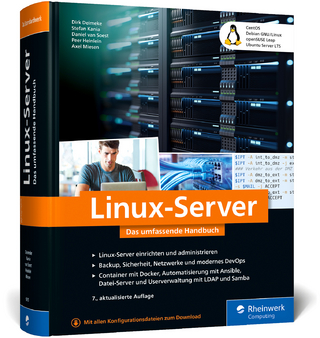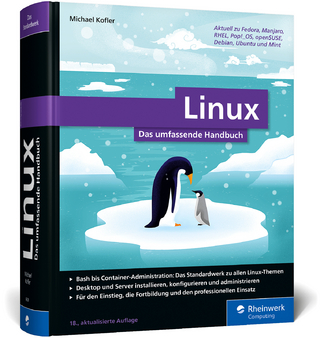
The Official Ubuntu Book
Prentice Hall (Verlag)
978-0-13-390539-7 (ISBN)
- Titel erscheint in neuer Auflage
- Artikel merken
»The Official Ubuntu Book, Eighth Edition«, has been extensively updated with a single goal: to make running today’s Ubuntu even more pleasant and productive for you. It’s the ideal one-stop knowledge source for Ubuntu novices, those upgrading from older versions or other Linux distributions, and anyone moving toward power-user status.
Its expert authors focus on what you need to know most about installation, applications, media, administration, software applications, and much more. You’ll discover powerful Unity desktop improvements that make Ubuntu even friendlier and more convenient. You’ll also connect with the amazing Ubuntu community and the incredible resources it offers you.
Learn how to
- Reliably install, customize, and update Ubuntu for any home, business, school, or government environment
- Get up and running quickly, and then explore Ubuntu and download powerful free software
- Customize Ubuntu for performance, accessibility, and fun
- Get comfortable with the highly efficient Ubuntu command line
- Install, administer, and secure Ubuntu Server, including advanced features such as LVM and RAID
- Get involved with related Ubuntu projects
- Help build, promote, distribute, support, document, or translate Ubuntu
- Get up-to-the-minute help and troubleshooting advice from Ubuntu users worldwide
Matthew Helmke has been an Ubuntu user since April 2005 and an Ubuntu Member since August 2006. He served from 2006 to 2011 on the Ubuntu Forum Council, providing leadership and oversight of the Ubuntu Forums, and spent two years on the Ubuntu regional membership approval board for Europe, the Middle East, and Africa. He has written articles about Ubuntu for magazines and Web sites, is the lead author of Ubuntu Unleashed, and has written several books and articles on other topics.
Elizabeth K. Joseph is a professional Linux Systems Administrator currently working at Hewlett-Packard, with a focus on managing the infrastructure for the OpenStack project. She has been working with Linux and around Linux communities since 2002. Elizabeth began contributing to Ubuntu in 2006 and currently contributes to various teams, including Documentation, News, Quality Assurance, and Classroom. Over the years she has served on the Ubuntu Membership Board and is now serving her third term as a member of the Ubuntu Community Council. At home in San Francisco, she serves as one of the leaders of the Ubuntu California team and is on the board of a nonprofit that provides Ubuntu-based computers to schools in need.
Jose Antonio Rey is a community contributor who has been actively participating since 2011. He is a student residing in Peru, whose contributions include helping with the News and Classroom teams, managing Ubuntu On Air!, and being the contact of the Ubuntu Peru team and a member of the LoCo Council. Even though he is not a developer, he has helped with Juju charms and is the author for the Postfix and Mailman charms.
Philip Ballew is an active open source advocate in the greater open source community. He is heavily involved in the Ubuntu project, and spends most of his time contributing to this project. When Philip is not contributing to Open Source, he can be found riding his bike, dancing badly, or attempting to pass his college classes. Philip is eager to get involved in any project that he sees making a difference in the world for the good, and enjoys Ubuntu for this reason. He currently calls sunny San Diego, California, home, and hopes all readers of the book come by and say hello to him there.
Benjamin Mako Hill is a long-time free-software developer and advocate. He was part of the founding Ubuntu team whose charge at Canonical was to help grow the Ubuntu development and user community during the project's first year. Mako is an Assistant Professor at the University of Washington and a fellow at the Berkman Center for Internet and Society at Harvard University. He holds a Ph.D. from MIT.
Table of Contents
Foreword to the Sixth Edition xix
Foreword to the First Edition xxi
Preface xxvii
Acknowledgments xxxi
About the Authors xxxiii
Introduction xxxv
Chapter 1: The Ubuntu Story 1
The Vision 2
Free Software, Open Source, and GNU/Linux 3
How the Vision Became Ubuntu 7
What Is Ubuntu? 12
Ubuntu Promises and Goals 17
Sustaining the Vision: Canonical and the Ubuntu Foundation 26
Beyond the Vision: Ubuntu Subprojects, Flavors, and Spin-Offs 31
Summary 33
Chapter 2: Installing Ubuntu 35
Choosing Your Ubuntu Version 36
Getting Ubuntu 38
Booting and Installing 42
Installing from the Minimal CD 54
Summary 61
Chapter 3: Getting Started with Ubuntu 63
Getting Acquainted with Unity 65
Using Applications 76
Using Ubuntu in Your Language 85
Configuring a Printer 86
Keeping Your Computer Updated 90
Adding and Removing Programs and Packages 92
Upgrading to the Next Ubuntu Release 95
Ubuntu and Multimedia 96
Backing Up 102
Customizing Ubuntu’s Look and Feel 104
Unity in Other Devices 105
Summary 105
Chapter 4: Finding and Installing Ubuntu Applications 107
Using the Ubuntu Software Center 108
Using Synaptic 115
Useful Software Packages to Explore 118
Summary 145
Chapter 5: Customizing Ubuntu for Performance, Accessibility, and Fun 147
Unity Terminology 148
Appearance Tool 153
Unity Tweak Tool 155
Compiz Config Settings Manager 159
Unity Lenses and Scopes 165
Additional Resources 166
Summary 166
Chapter 6: Becoming an Ubuntu Power User 167
Administering System and User Settings 168
Understanding How Linux Stores and Organizes Files 172
Learning Unity Keyboard Shortcuts 175
Using the Terminal 179
Working with Windows Programs 180
Installing Software from PPAs 181
Compiling Software from Source 183
Summary 184
Chapter 7: Welcome to the Command Line 185
Starting Up the Terminal 186
Getting Started 187
Building Pipelines 188
Running Commands as Superuser 189
Finding Help 190
Moving around the Filesystem 191
Manipulating Files and Folders 192
System Information Commands 193
Searching and Editing Text Files 194
Dealing with Users and Groups 195
Getting Help on the Command Line 196
Searching for Man Files 197
Using Wildcards 197
Executing Multiple Commands 198
Moving to More Advanced Uses of the Command Line 200
Summary 201
Chapter 8: The Ubuntu Server 203
What Is Ubuntu Server? 204
Installing Ubuntu Server 206
Ubuntu Package Management 218
Ubuntu Server Security 229
Advanced Topics 236
Summary 243
Chapter 9: Ubuntu-Related Projects and Derivatives 245
Recognized Flavors 246
Editions 256
Other Distributions 259
Launchpad 261
Bazaar 270
Ubuntu One 272
Summary 272
Chapter 10: The Ubuntu Community 273
Venues 275
Teams, Processes, and Community Governance 289
Getting Involved 299
Summary 302
Index 305
| Erscheint lt. Verlag | 31.7.2014 |
|---|---|
| Vorwort | Mark Shuttleworth |
| Zusatzinfo | illustrations |
| Verlagsort | New Jersey |
| Sprache | englisch |
| Maße | 180 x 234 mm |
| Gewicht | 602 g |
| Einbandart | kartoniert |
| Themenwelt | Informatik ► Betriebssysteme / Server ► Unix / Linux |
| Schlagworte | Linux (Ubuntu) |
| ISBN-10 | 0-13-390539-X / 013390539X |
| ISBN-13 | 978-0-13-390539-7 / 9780133905397 |
| Zustand | Neuware |
| Haben Sie eine Frage zum Produkt? |
aus dem Bereich



